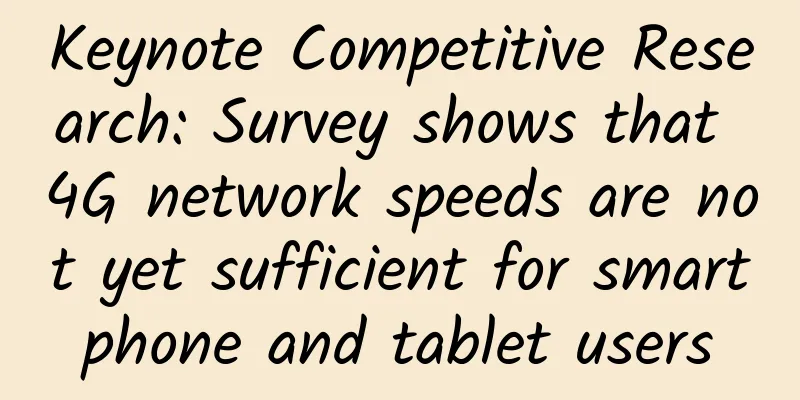Keynote Competitive Research: Survey shows that 4G network speeds are not yet sufficient for smartphone and tablet users

|
In theory, the upper limit of 4G connection speed is 100 Mbps. But in practice, under the best 4G network conditions, the fastest download speed that users can experience is only 30 Mbps. Under normal circumstances, the downlink speed that users can experience is only about 10Mbps. According to the survey results of Keynote Competitive Research, this speed cannot meet user needs at all.
The survey by Keynote, an investigation agency, came to this conclusion through a survey of 5,000 smartphone and tablet users in the United States. The survey also found that users' requirements for the connection speed of various network devices, whether desktops, smartphones or tablets, are gradually increasing. The vast majority of respondents are not satisfied with the current situation, especially smartphone and tablet users. Users expect the network speed of smartphones and tablets to be close to that of desktops, but most operators do not attach importance to this, which is likely to cost them. In Keynote's survey of smartphone users about the "worst mobile web experience in the past two months," two-thirds of respondents chose "slow web page loading." Nearly half of respondents chose "poor smartphone web page optimization." In addition, 64% of respondents hope that smartphone web pages will load within 4 seconds, and 82% hope that they will load within 5 seconds. The survey results of tablet users are roughly the same as those of smartphone users, except that they have higher requirements for Internet speed. 60% of tablet users hope that web pages can load in less than 3 seconds. However, this wish may be difficult to achieve, because Keynote Research has conducted a survey on most mainstream websites, and no website can load web pages in less than 3 seconds. In summary, mobile device users want to experience faster Internet speeds, and nearly half of smartphone users want web pages to be optimized. However, the current situation makes it difficult to meet these user demands. First, 4G network bandwidth is limited. In a certain area, the available bandwidth will be divided up as the number of users increases. When the number of users reaches a certain level, AT&T and Verizon are likely to limit the speed of network services to ensure that every user can use the bandwidth network normally. In addition, the HTTP protocol itself has not kept up with the development of the times. Chris Storm, author of The SPDY Book, pointed out that under the HTTP protocol, in order to open a new web page, multiple links need to be restarted or disconnected. However, the upper limit of each operation is 6 links. When the connection speed reaches 4Mbps, even if it continues to increase, the loading speed of traditional text or JavaScript web pages will not be significantly improved. Storm said that if users want a better mobile network experience, they should choose a browser or web service that supports Google's SPDY protocol. Storm said, "Under the SPDY protocol, there is no upper limit to the number of Web commands that a single SPDY connection can handle. This one-way processing of Web commands makes SPDY more efficient than HTTP and TCP protocols. Since the browser or other Web service does not have to repeatedly receive and respond to commands, the loading time will be significantly shortened." For mobile network users, the SPDY protocol can reduce web page loading time by 28% to 55%. Don Aoki, senior director of Keynote, said: "Our survey found that users not only use mobile devices such as smartphones and tablets to handle instant messaging, but also increasingly use mobile applications to send and receive emails or complete banking transactions. This user's independent choice of mobile network services is crucial for operators because operators can develop corresponding mobile service businesses based on the needs of users of different devices and conduct surveys and evaluations on user experience." Nowadays, many users are not satisfied with the Internet speed of their mobile devices. Mobile operators had better find a solution as soon as possible, otherwise it is likely to cause customer loss. |
Recommend
What is the reason for lower abdominal bloating and pain?
When bloating and pain occur in the lower abdomen...
What to do when you are angry and have stomachache
People must control their emotions in normal time...
Married for two years without getting pregnant
Contemporary young people pay less and less atten...
What to eat to maintain the ovaries and uterus
A healthy body can make us more confident. We mus...
The best time to treat postpartum wind, medical experts will answer you
For postpartum wind, a common confinement disease...
Can I drink green tea when my period is coming?
Can I drink black tea during menstruation? First ...
Why does a woman's left rib hurt?
In many cases, rib pain has become a common disea...
Do you know how to treat menopausal functional uterine bleeding?
When women reach menopause, some normal physiolog...
What to do if you have stomach pain during pregnancy
What should I do if I have stomach pain during th...
Baking soda for women to prepare for pregnancy
Baking soda for women: during the pregnancy prepa...
How long can an ovum survive in the body?
Healthy women ovulate every month, and strong and...
What should I do if the vaginal opening is itchy and painful?
Vaginal itching is likely to be accompanied by gy...
What to do if the leucorrhea is yellowish
If a woman has abnormal leucorrhea due to some re...
How to get started quickly at 39 weeks plus 5 days
For women, pregnancy and childbirth are both beau...
What is the area between the vagina and anus called?
The part connecting the female vagina and anus is...









